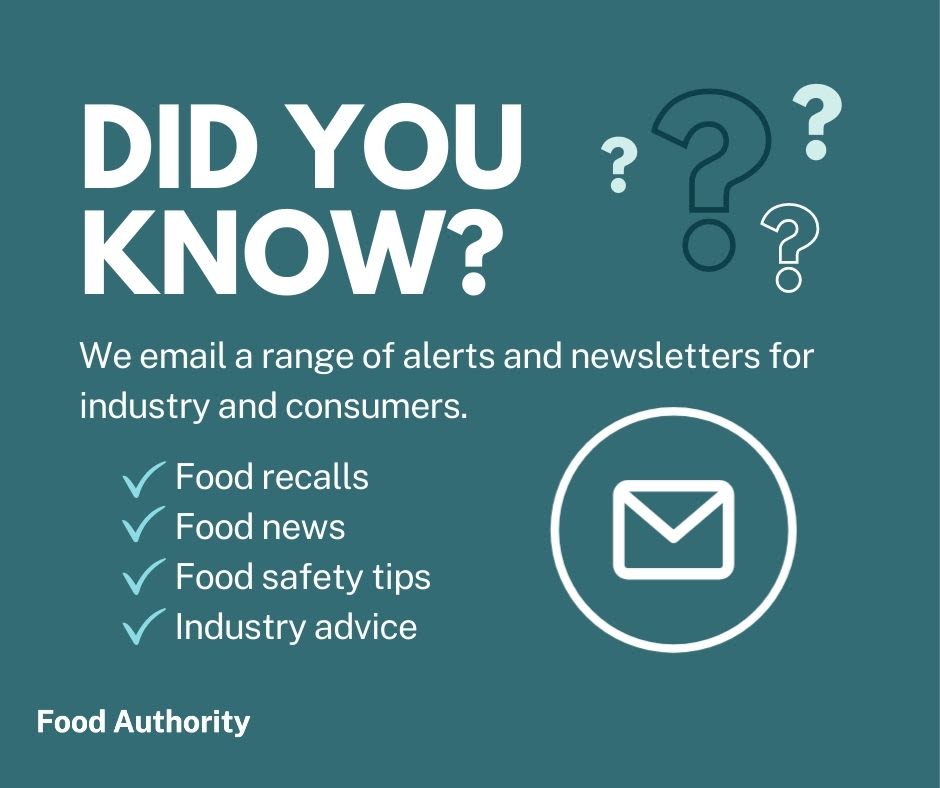Foodwise Summer
Summer 2023 | Issue 66
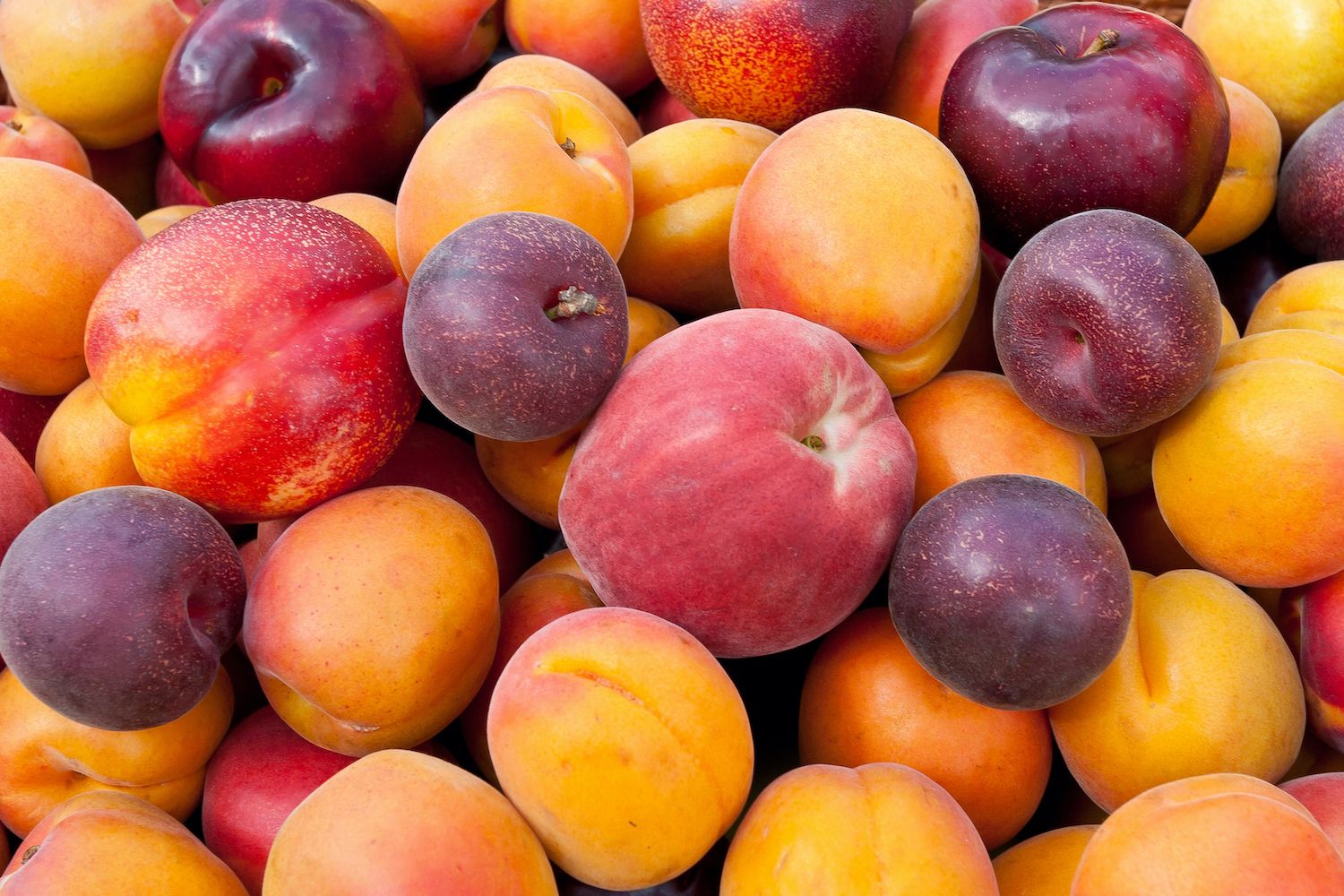
Foodwise - Summer edition
Welcome to the quarterly newsletter from the NSW Food Authority, featuring the latest information for the NSW food industry.
Highlights in this edition include:
- Standard 3.2.2A starts from Friday
- Summer food safety
- Warmer weather and pest control
- New guide: Eating with low immunity
- Requirements for wet storage of shellfish
- Changes proposed to define added sugars
- Labelling transition period ends in February
- Plus, much more.
Is there something you’d like to see in Foodwise? Let us know at food.contact@dpi.nsw.gov.au or phone 1300 552 406.
New guide: Eating with low immunity
Some foods have a higher risk of causing food poisoning - the risk can be serious for people with low or compromised immune systems.
The Food Authority’s new factsheet Food risk and you - what to eat with a weakened immune system (PDF, 224 KB) lists foods people with weakened immune systems should avoid as well as safer alternatives.
More information on reducing the risk of getting sick from food is on our low immunity page.
Charcuterie Champion - 2023 Sydney Royal Fine Food Show
Congratulations to Hungerford Meat Co whose MR Charcuterie Pâté de Campagne pork + pistachio terrine was recently named winner of the NSW Food Authority sponsored Champion ‘Other Charcuterie Products’ Annual Trophy at the 2023 Sydney Royal Fine Food Show.
Our annual sponsorship of the Royal Agricultural Society’s Sydney Royal Fine Food Show is an opportunity to recognise and celebrate talented food producers in NSW and promote excellence and innovation in the food industry.
The awards were presented at the Grape, Grain & Graze Festival held in September and were the culmination of a month of judging across 7 competitive categories.
You can view the full results here.

NSW Food Authority CEO Lisa Szabo presents the award to Michael Robinson, owner of Hungerford Meat Co. based in Branxton.
NSW Food Authority CEO Lisa Szabo presents the award to Michael Robinson, owner of Hungerford Meat Co. based in Branxton.

Winner, Hungerford Meat Co.
Winner, Hungerford Meat Co.
Summer food safety
It’s important to remember that as the temperature rises, so does the risk of food poisoning.
In fact, the most common bacteria associated with food poisoning is Salmonella, which typically spikes to almost double the number of cases in summer compared with the winter months.
Warmer weather, excess food sitting out for longer periods than usual and an abundance of leftovers, are just a few of the things that can lead to an increased risk of food poisoning during this time – particularly for those more vulnerable, such as the elderly, the young, pregnant women and those who are immune compromised.
Food poisoning can be more than just a stomach ache, it can be life threatening, especially for people with a weakened immune system. The good news is that keeping food safe can be quick and easy and for the most part, it’s all in your (washed) hands – the first step is to follow the four golden rules for keeping food safe.
Four Golden Rules of food safety
The Food Authority has a wealth of information on its website about keeping food, yourself, and those you love safe - including preparing for an emergency by playing it safe and having food on hand that doesn’t need refrigeration or heating. Find out more about food safety during an emergency here.
Check out our food safety guide for summer eating here.

Annual Food Testing Report 2022-2023
The NSW Food Authority’s primary objective is to provide consumers in NSW with safe and correctly labelled food.
To support this objective, the Food Authority regularly conducts testing of food products to ensure compliance with regulatory requirements as part of foodborne illness investigations and to gather information to identify and respond to food safety issues. It also undertakes scientific surveillance projects to identify and better understand food safety issues and risks in NSW. The data obtained in these surveillance projects allows the Food Authority to identify and respond to key food safety issues and develop systems and processes to effectively manage the prevention of foodborne illness and maintain food safety.
At the end of each financial year, the Food Authority reports on the testing conducted by its primary testing provider (BVAQ), and other laboratories. Other laboratories used during 2022-2023 included Elizabeth Macarthur Agricultural Institute (EMAI) for microbiological analyses, NSW Health Pathology for serotyping and whole genome sequencing, and Symbio Laboratories for shellfish toxin testing.
You can read the Annual Food Testing Report 2022-2023 here.
Emergency animal diseases and food safety
Australia has an excellent track record of preventing emergency (exotic) animal diseases from entering our country. What would happen if an emergency animal disease (EAD) outbreak did occur? Are there any food safety concerns resulting from an EAD outbreak?
What is an Emergency Animal Disease (EAD)?
An EAD is an animal disease that has the potential to cause substantial impacts to animal or human health, the environment, or the economy and is of national significance. Whilst there are several diseases considered as EADs, the top diseases of concern for food producing animals in Australia currently are foot-and-mouth disease, lumpy skin disease, African swine fever, and avian influenza.
What happens if an EAD is detected?
A detection of an EAD in Australia triggers a nationally agreed response structure. Affected states and territories are responsible for implementing EAD responses within their boundaries. This includes finding out where the disease is/where it has come from and controlling the spread so that the disease can be eradicated as soon as possible.
When an EAD is found on a farm, the farm is quarantined so that movement of animals, people and machinery on and off the farm is highly restricted. Any properties that are found to have animals that test positive for an EAD are classified as an infected premises. Depending on the disease, an area surrounding the farm may also be quarantined to restrict further movements and potential disease spread into and out of the area.
Should I be concerned about food safety during an EAD outbreak?
For diseases such as foot-and-mouth disease, lumpy skin disease, African swine fever, and avian influenza there are no food safety concerns for humans, although these diseases would have a devastating impact on the agricultural industry. In the extremely unlikely event that infected products (meat, eggs etc.,) were able to enter the food chain, humans would not be affected by consuming or using these products.
Regardless of this, any animal that is infected with an EAD or with any links to an infected premises are not permitted to go into the food chain. This includes any animals that were transported off an infected premises within a certain period of time before the disease was detected. Generally, these animals will be humanely destroyed on-farm and disposed of either on-farm or at an appropriate disposal site.
To report a suspected EAD call the Emergency Animal Disease Watch hotline on 1800 675 888 or contact a vet.
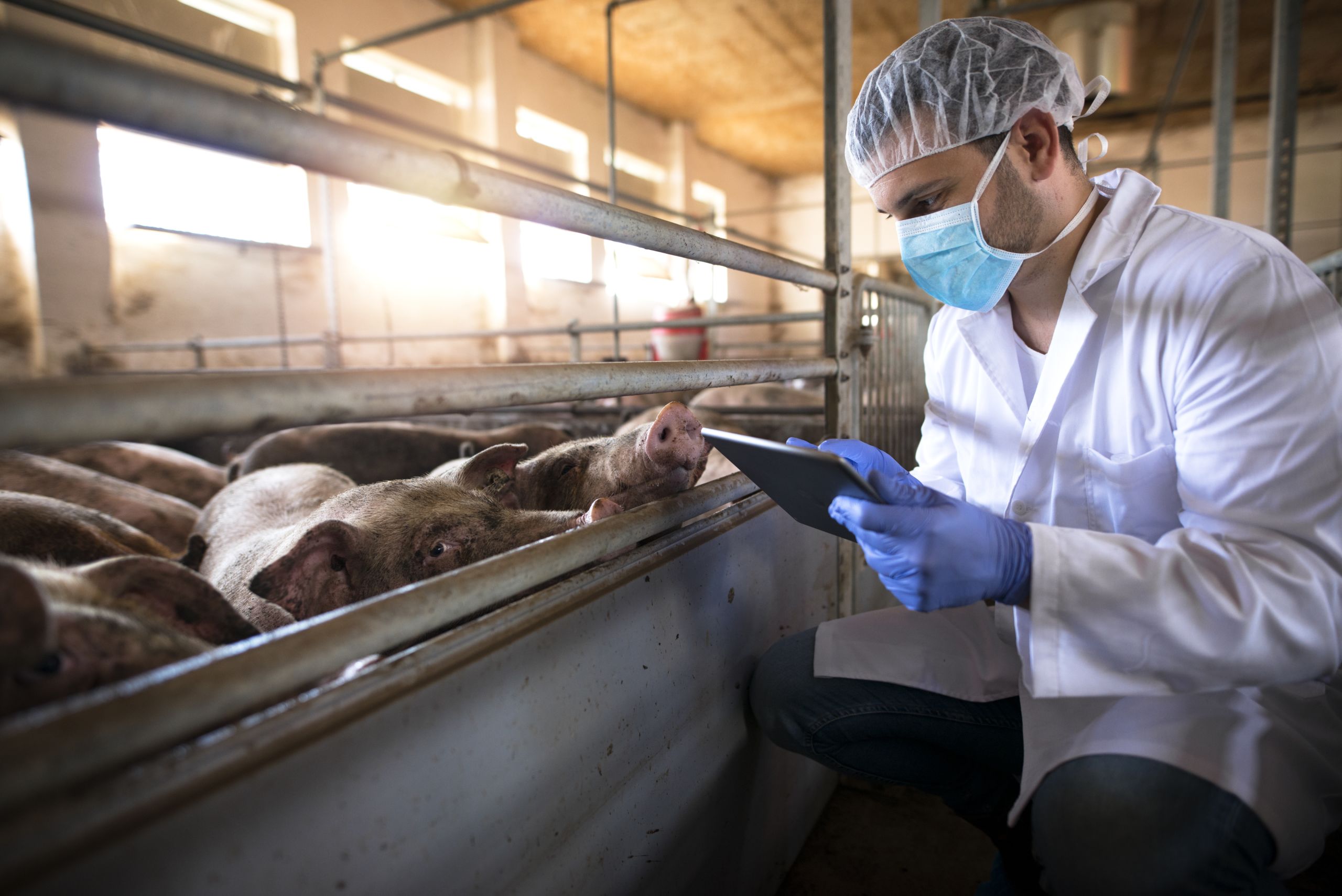
Food Ministers’ Meeting
The Food Ministers’ Meeting (FMM) was held Friday 1 December 2023 to consider food regulation and policy matters.
Chaired by the Hon Ged Kearney MP, the FMM comprises all Australian and New Zealand Ministers responsible for food.
Matters discussed included:
- defining added sugars for claims
- Priority 3 System Modernisation update
- Health Star Rating: Year 3 Monitoring Plan
- commercial foods for infants and young children
- alcohol labelling.
More detail on the meeting outcomes is expected to be published on the Food Regulation website this week.
The next meeting will be held in the first half of 2024.
Retail
Standard 3.2.2A starts from Friday
New requirements apply from 8 December for most businesses selling unpackaged, ready-to-eat potentially hazardous food to consumers.
Standard 3.2.2A of the Food Standards Code requires retail and food service businesses to have a qualified Food Safety Supervisor and ensure their food handlers are trained. Higher-risk food handling also triggers a requirement to demonstrate safe food practices.
The Standard does not apply to businesses licensed with the NSW Food Authority, businesses that only manufacture or wholesale food with no direct sale to consumers and the handling of food for fundraising.
More time for some sectors
School canteens, children’s services, coffee vendors that serve food, supermarkets, delis, greengrocers, correctional centres and boarding schools now have until 8 December 2024 to comply with Standard 3.2.2A in NSW.
The additional 12 months was provided for sectors previously exempt from the NSW Food Safety Supervisor program in a legislative amendment defining how Standard 3.2.2A applies in NSW.
The amendment also clarified that all handling or sale of food for raising funds solely for community or charitable causes is exempt from the requirements.
Learn more about Standard 3.2.2A or try the quiz for businesses.

Take our short quiz to find out which Food Safety Management Tools apply to your business, under the new Standard 3.2.2A in the Australia New Zealand Food Standards Code.
Take our short quiz to find out which Food Safety Management Tools apply to your business, under the new Standard 3.2.2A in the Australia New Zealand Food Standards Code.
Potting mix storage and display
Potting mix is commonly sold in supermarkets, convenience stores and service stations – and it’s important that retailers store and display potting mix away from food to prevent contamination.
The ingredients and dampness in potting mix make it an ideal breeding ground for bacteria. It may contain other biological, chemical and physical contaminants that can also pose a health risk to customers.

Potting mix
Potting mix
Under the Food Standards Code, food businesses have an obligation to protect food from contamination. Bags must be handled carefully by employees and customers, especially when purchased with food items.
If you’re a food business and also sell potting mix, the Food Authority’s new factsheet Potting mix storage and display (PDF, 74.7 KB) details other actions you can take to keep staff and customers safe.
Be vigilant with pest control as the weather warms up
Food businesses need to be extra vigilant in their pest control regime in summer - as pests are more likely to seek out food, water, and shelter in the warmer months.
Common pests such as rats, mice and cockroaches can carry bacteria and viruses that can contaminate food and food contact surfaces.
Practical pest prevention
The Food Standards Code requires food businesses to take all practicable measures to:
- prevent pests entering the premises, and
- eradicate and prevent the harbourage of pests on the food premises.
Measures to prevent entry of pests include:
- sealing all holes, gaps and cracks in walls, ceilings and floors
- installing and maintaining flyscreens to window and door openings
- keeping doors closed when not in use
- installing weather strips at the base of doors.
Measures to eradicate and prevent harbourage of pests include:
- regular checks for signs of pests
- maintaining the food premises and equipment in a clean condition (a cleaning schedule may assist)
- keeping food covered in sealed containers
- storing food, equipment and food containers off the floor
- keeping garbage storage areas clean and tidy
- removing rubbish regularly and ensuring external areas are clean and well-maintained
- removing unused equipment and fixtures from the premises
- implementing a suitable pest control program, which may require the services of a licensed pest controller.
Using a licensed pest controller
While using the services of a licensed pest controller is not a legal requirement, it can help you to demonstrate that you are taking all practicable measures to eradicate and prevent the harbourage of pests.
Read more in Pest control in food businesses on our website or watch our video: What to expect: Inspections for more.
What to expect: Inspections

Meat
Inspections and audits
From July to September 2023, authorised officers conducted 988 audits and inspections of licensed meat businesses, resulting in a 2% drop in compliance, compared to the same time last year. Corrective actions relating to analytical testing and the level of preservative use in processed meats were identified and actioned. Poor understanding of the food standards that limit preservative use in processed meats was found to be the contributing factor.
This is a repeated area of non-compliance for the meat sector. Food Authority authorised officers will be providing guidance and educational materials to key stakeholders, industry and regulated businesses and will continue to target future compliance activities within the meat retail sector to address the risks associated with the use of preservative and individual poor performance.
The table below shows comparable data for compliance and audit activity in the meat sector between the same reporting periods in 2022 and 2023.
|
Reporting Period |
Jul – Sep 2022 |
Jul – Sep 2023 |
|---|---|---|
|
Audits & Inspections |
516 |
988 |
|
Compliance rate |
96% |
94% |
Seafood and Shellfish
Inspections and audits
From July to September 2023, the Food Authority conducted 89 audits and inspections of licensed seafood businesses resulting in a 1% increase in compliance, compared to the same reporting period in 2022.
The Food Authority has moved to a risk based, outcome focused operational model, and consistent with the priority classification scheme for a seafood business (currently P2), audit frequency will remain at a 2-year cycle. Complaints, inspections, and investigations relating to seafood businesses will continue to be managed on an as needs basis.
The table below shows yearly comparable data for compliance and audit activity in the seafood sector between the same reporting periods in 2022 and 2023.
|
Reporting Period |
Jul – Sep 2022 |
Jul – Sep 2023 |
|---|---|---|
|
Audits & Inspections |
95 |
89 |
|
Compliance rate |
97% |
98% |
Seafood Industry Forum
The NSW Seafood Industry Forum was held on 13 September 2023.
Issues considered by the Forum via video conference during the meeting included updates on:
- Seafood industry food safety compliance activities for the 2022-2023 financial year to date
- White spot response and program update
- Proposed new management measures for shellfish wet storage systems
- Biosecurity update.
A full summary of meeting outcomes is available here.
More information about the NSW Seafood Industry Forum, including its purpose, functions, and membership can be found on the NSW Food Authority’s website.
The next meeting of the NSW Seafood Industry Forum is to be advised.

Food safety and biosecurity requirements for the wet storage of shellfish
Wet storage is a shelf-life extension process where previously harvested shellfish are re-immersed in water to store, remove sand, or improve condition.
The wet storage of shellfish poses unique and significant food safety and biosecurity risks, and these must be considered when installing and implementing wet storage processes. Proper construction, operation and maintenance of wet storage systems is crucial to safe wet storage of shellfish. Careful consideration of disposal of water and shellfish within wet storage systems is needed, as it has the potential to pose food safety and aquatic biosecurity risks if not carefully managed.
Approval of wet storage systems
Wet storage is a licenced activity with the NSW Food Authority, and licensed businesses must have this approval listed on their food licence to conduct wet storage of shellfish. Licence application form LIC006 can be completed to apply to have wet storage listed on a current Food Authority licence.
Once a licence application has been received Food Authority officers will assess the wet storage facility for approval. There are number of manufacturers providing wet storage system options. It is important to note that no wet storage systems are pre-approved (“off the shelf”) at this stage. Current requirements can be found in the NSW Shellfish Industry Manual. Businesses will also need an appropriate food safety plan. Modifications to existing approved systems, including capacity increases, must be approved prior to operating the modified system.
Biosecurity requirements
Biosecurity requirements are currently in development and will be formalised and enforced in legislation following consultation with the industry. A single set of wet storage guidelines, covering both food safety and biosecurity requirements, will be released shortly as part of this process. Once these requirements are finalised the NSW Food Authority will commence wet storage facility inspections to ensure wet storage systems meet the amended requirements.
What to do
If your business operates a wet storage system, you must have wet storage listed on your NSW Food Authority licence and have your system approved by the NSW Food Authority prior to usage of that system.
The NSW Shellfish Program can be contacted on (02) 6552 3000 (option 2) or via email to food.nswsp@dpi.nsw.gov.au to discuss system options prior to design and purchase. You can also contact them if you are unsure if your business is licensed for wet storage or to check if your wet storage system has been approved.
Until the new biosecurity measures are finalised, existing wet storage systems must follow current biosecurity movement rules (for example POMS and QX restrictions) and must not be used to hold products originating outside of NSW without prior approval from NSW DPI Aquatic Biosecurity. To discuss biosecurity considerations, please contact NSW DPI Aquatic Biosecurity on (02) 4916 3900 or aquatic.biosecurity@dpi.nsw.gov.au.

Current requirements can be found in the NSW Shellfish Industry Manual. Businesses will also need an appropriate food safety plan.
Current requirements can be found in the NSW Shellfish Industry Manual. Businesses will also need an appropriate food safety plan.
Dairy
Inspections and audits
From July to September 2023, the Food Authority conducted 203 audits and inspections of licensed dairy businesses. This industry sector has maintained a high compliance rate with 98% of businesses recording an acceptable result.
The main audit items attracting Corrective Action Requests during the period were for hygiene and sanitation and food safety program.
The table below shows yearly comparable data for compliance and audit activity in the dairy sector between the same reporting periods in 2022 and 2023.
|
Reporting Period |
Jul – Sep 2022 |
Jul – Sep 2023 |
|---|---|---|
|
Audits & Inspections |
221 |
203 |
|
Compliance rate |
98% |
98% |
Periodic review of the risk assessment: Dairy Food Safety Scheme
The risk assessment of the Dairy Food Safety Scheme undertaken this year, examined information sources including:
- foodborne illness reports and recall data in Australia attributed to dairy and dairy products
- international issues arising from human illness or perceived hazards linked with dairy and dairy products
- border detections for dairy and dairy products
- risk assessments of dairy and dairy products
- emerging issues in the farm to consumer continuum for dairy and dairy products relevant to health risk
- research findings related to hazards in dairy and dairy product production and processing
- baseline surveys of microbiological and chemical hazards in dairy and dairy products
- other relevant sources if identified during the above activities
The risk assessment concludes that regulations are still applicable to manage risk.
View the Dairy Food Safety Scheme: periodic review of the risk assessment, September 2023 (PDF 719KB, 74pp).
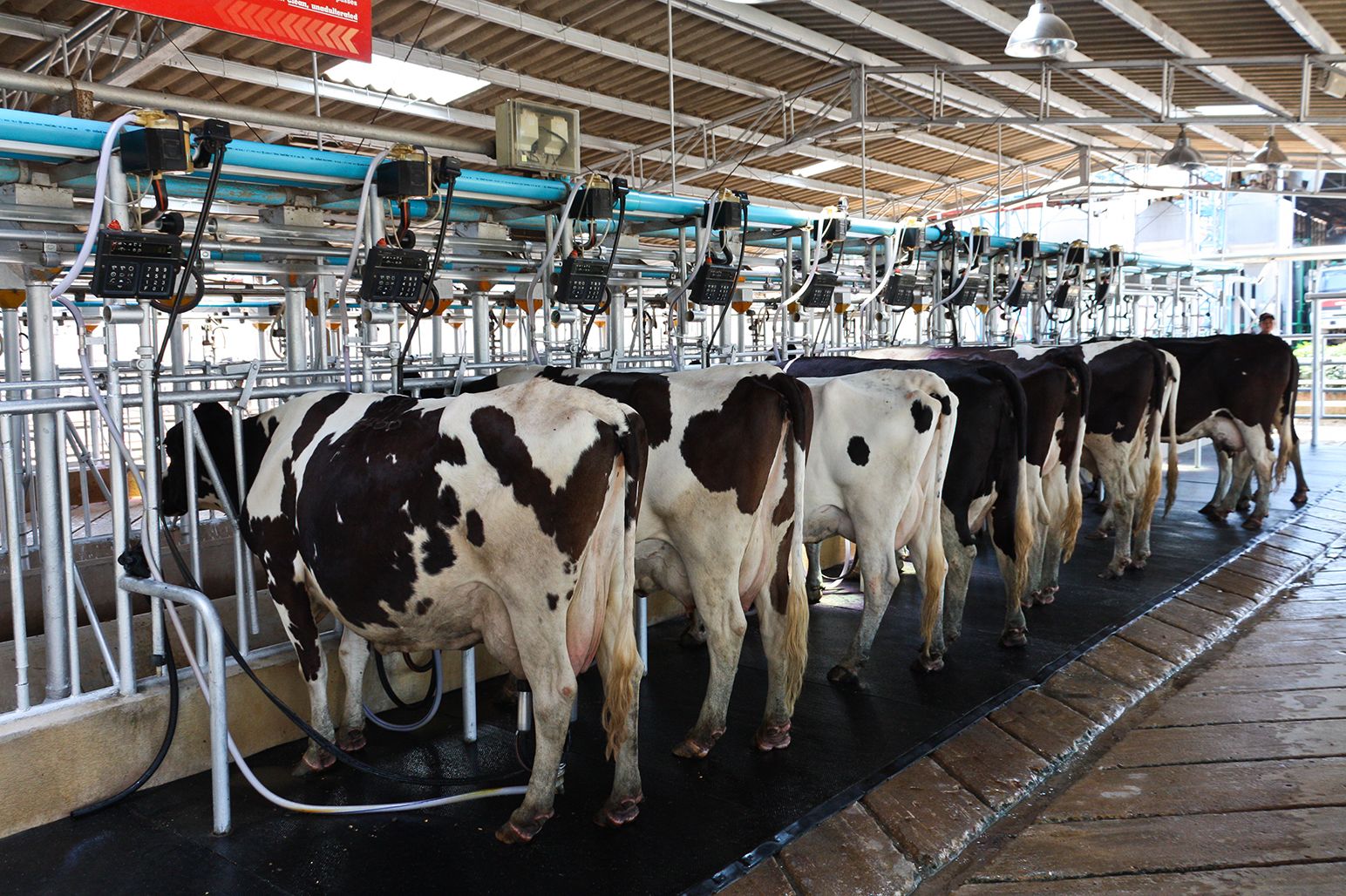
Eggs
Inspections and audits
From July to September 2023, the Food Authority conducted 91 audits and inspections of licensed egg businesses resulting in a 2% drop in compliance, compared to the same reporting period in 2022.
The main areas where critical defects have been raised at audit continue to be with process control, analytical testing, and food safety program monitoring. There have been no consecutive failures and most defects raised have been rectified immediately which demonstrates that effective corrective actions are being implemented by businesses.
The table below shows yearly comparable data for compliance and audit activity in the egg sector between the same reporting periods in 2022 and 2023.
|
Reporting Period |
Jul – Sep 2022 |
Jul – Sep 2023 |
|---|---|---|
|
Audits & Inspections |
72 |
91 |
|
Compliance rate |
96% |
94% |
Egg Industry Consultative Committee
The last Egg Industry Consultative Committee was held on 16 August 2023.
Issues considered by the Committee via video conference during the meeting included updates on:
- egg industry food safety compliance activities for the 2022-2023 financial period
- animal welfare update, including updates on:
- Poultry Standards & Guidelines
- Livestock Standards & Guidelines - biosecurity update.
A full summary of meeting outcomes is available here.
More information about the Egg Industry Consultative Committee, including its purpose, functions, and membership can be found on the NSW Food Authority website.
The next meeting of the NSW Egg Industry Forum is to be advised.
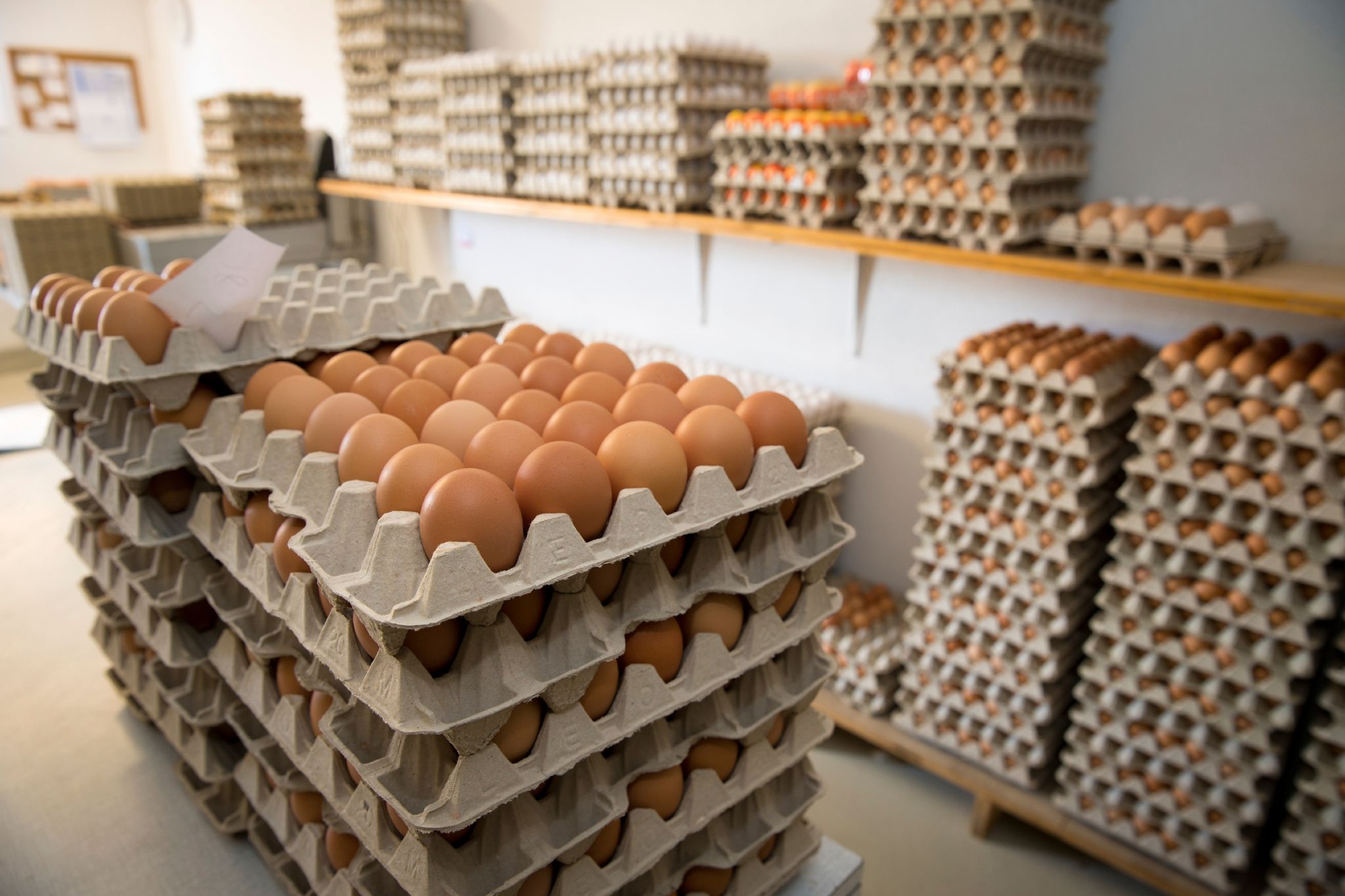
Salmonella Enteritidis testing
Under the Biosecurity (Salmonella Enteritidis - SE) Control Order there is a requirement for SE environmental testing every 12-15 weeks.
A review of licensee data who used the testing services paid by the Food Authority and submitted their samples to EMAI, Birling laboratories, or participated in the National Salmonella Enteritidis Monitoring & Accreditation Program, revealed a lack of information on the activities of 155 businesses. These businesses might submit their samples to other laboratories and will be contacted to provide evidence of their testing and results. If no testing was done or no information is returned, compliance activities will commence.

Environmental testing for SE is an important form of early detection that can mitigate the risk of human illness from consuming eggs and egg products.
Plants
Inspections and audits
From July 2023 to September 2023, the Food Authority conducted 30 audits and inspections of licensed plant product businesses. The compliance rate remained steady at 95% compared to the same reporting period in 2022.
The main audit items attracting Corrective Action Requests during the period were for failing to comply with Food Standards Code and hygiene and sanitation issues.
The table below shows yearly comparable data for compliance and audit activity in the plant sector between the same reporting periods in 2022 and 2023.
|
Reporting Period |
Jul – Sep 2022 |
Jul – Sep 2023 |
|---|---|---|
|
Audits & Inspections |
42 |
30 |
|
Compliance rate |
95% |
95% |
Food safety in horticulture
Fresh fruit and vegetables are an important part of a healthy diet and horticultural produce is generally considered safe. However, foodborne illness, product recalls and other food safety incidents continue to be linked to fresh horticultural produce. Such events can be readily reduced through appropriate food safety measures.
Following an extensive review by Food Standards Australia New Zealand (FSANZ), in August 2022, Food Ministers approved 3 new primary production and processing standards for berries, leafy vegetables and melons.
The new standards were added to Chapter 4 of the Food Standards Code, with a 30-month transition period for implementation, taking effect from 12 February 2025.
The nationally consistent standards aim to strengthen food safety management on-farm and during initial processing to reduce food safety risks along the horticulture supply chain from farm to fork. The standards are specific to each commodity group to address their particular food safety risks, and contain requirements including notifying authorities, product traceability, managing safety of inputs, and worker and premises hygiene.
To find out more, visit Food safety in horticulture (FSANZ webpage) and/or view their video: Introducing 3 horticulture standards for Australia
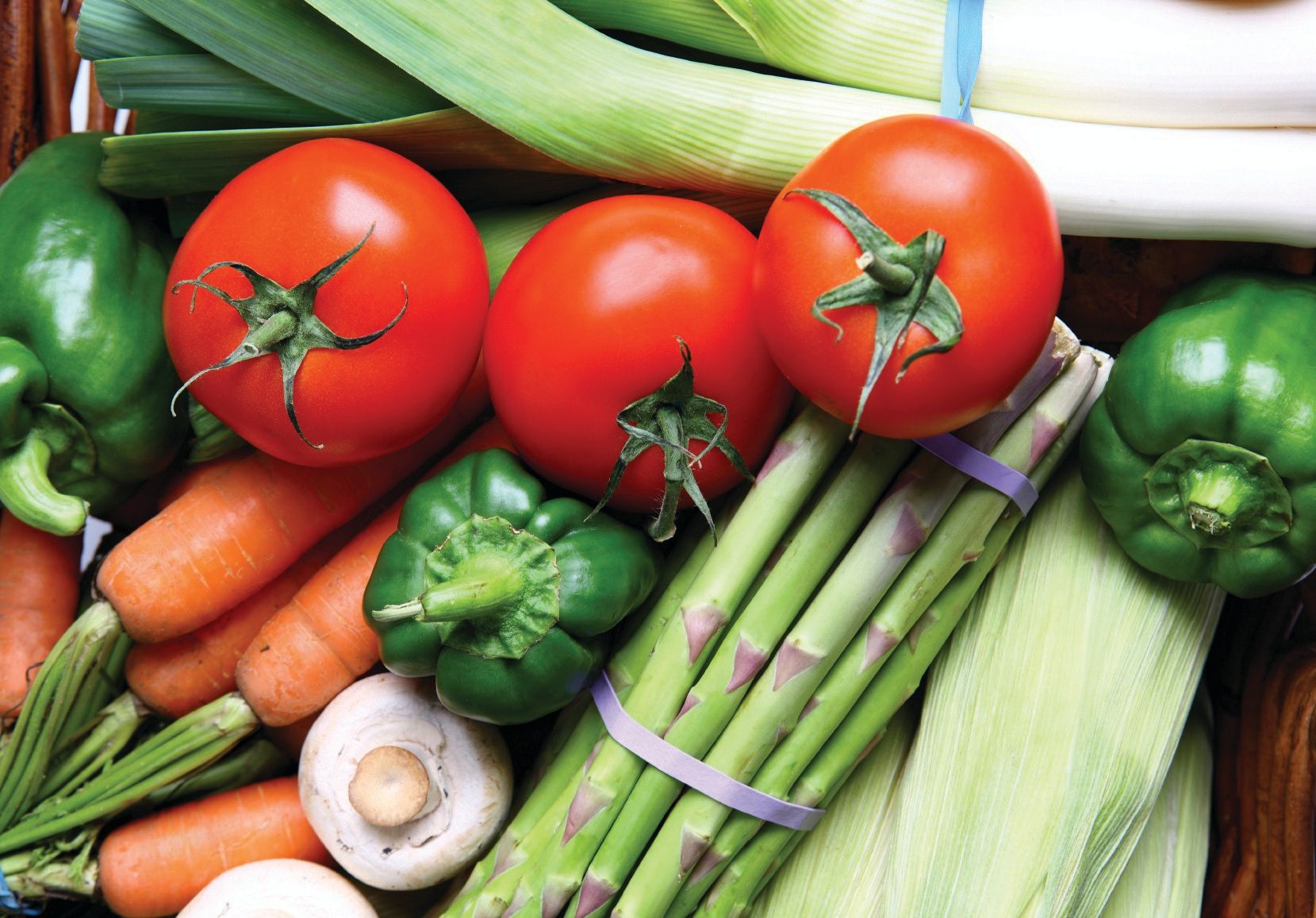
Vulnerable People
Inspections and audits
From July to September 2023, the Food Authority conducted 287 audits and inspections of licensed hospitals and aged care businesses. Compliance across the vulnerable persons industry remains high and achieving 99% compliance during the period.
For the reporting period the main audit items attracting Corrective Action Requests (CAR’s) were for pre-requisite programs (failing to correctly implement calibration program) and process control (failure to complete monitoring records at the frequency required in the food safety program).
The table below shows yearly comparable data for compliance and audit activity in the vulnerable persons sector between the same reporting periods in 2022 and 2023.
|
Reporting Period |
Jul – Sep 2022 |
Jul – Sep 2023 |
|---|---|---|
|
Audits & Inspections |
464 |
287 |
|
Compliance rate |
99% |
99% |
Facilities licensed to provide food service to vulnerable persons
All facilities licensed under NSW Food Regulation to provide food service to vulnerable persons are reminded of their responsibility to only serve safe and suitable food to their patients, residents and customers.
Licensees are encouraged to check their Food Safety Program (FSP) to ensure it has appropriate controls in place for service of high-risk foods, and that the FSP is being complied with.
Menu design for food service to vulnerable populations
Anyone with a suppressed immune system has a significantly higher risk of contracting a foodborne illness, such as listeriosis, when consuming high risk foods. Facilities need to take particular care when designing menus for vulnerable persons and selecting suppliers of ingredients.
Facilities should check all menus against their Food Safety Program (FSP) to ensure there are appropriate food safety controls in place for any high-risk foods identified. If high risk foods are identified that do not have appropriate controls in place, these should be removed immediately from the menu and replaced with a suitable alternative.
For example, instead of purchasing high risk pre-cooked shredded chicken, which has an extended shelf life for use in salads and sandwiches, a facility may prepare their own shredded chicken by:
- freshly cooking chicken pieces to a minimum core temperature 75°C,
- rapidly cooling in accordance with the 2-hour/4-hour rule,
- shredding and storing under refrigeration in a sealed container marked with the date of production or a use by date
- restricting time the product is out of refrigeration for sandwich or salad preparation to a maximum of 1 hour
- using or discarding any product after 48 hours, including product already made into salads and sandwiches
- maintaining cooking, cooling and salad / sandwich preparation and service monitoring records.
Guidelines for Food Service to Vulnerable Persons (Guidelines) details the mandatory requirements of your FSP, as well as elements that will be looked at and assessed by authorised officers.
Facilities that use the Guidelines and can demonstrate compliance do not need to conduct any further validation of their menu design.
Facilities that wish to use a food safety control that is different from those detailed in the Guidelines are required to appropriately validate their controls, document the controls in their FSP, and demonstrate that they are producing safe and suitable food via monitoring records.
An example of suitable evidence is a packed-on date on the label or a specification in the food safety program for a ready-made salad that states the shelf life of the product is less than 7 days from the date of packaging and maintain monitoring records demonstrating that the shelf life is checked on receival and at service of the salad.
For questions about menu design, implementing appropriate controls or for help in identifying high risk foods, please contact your auditor for assistance.
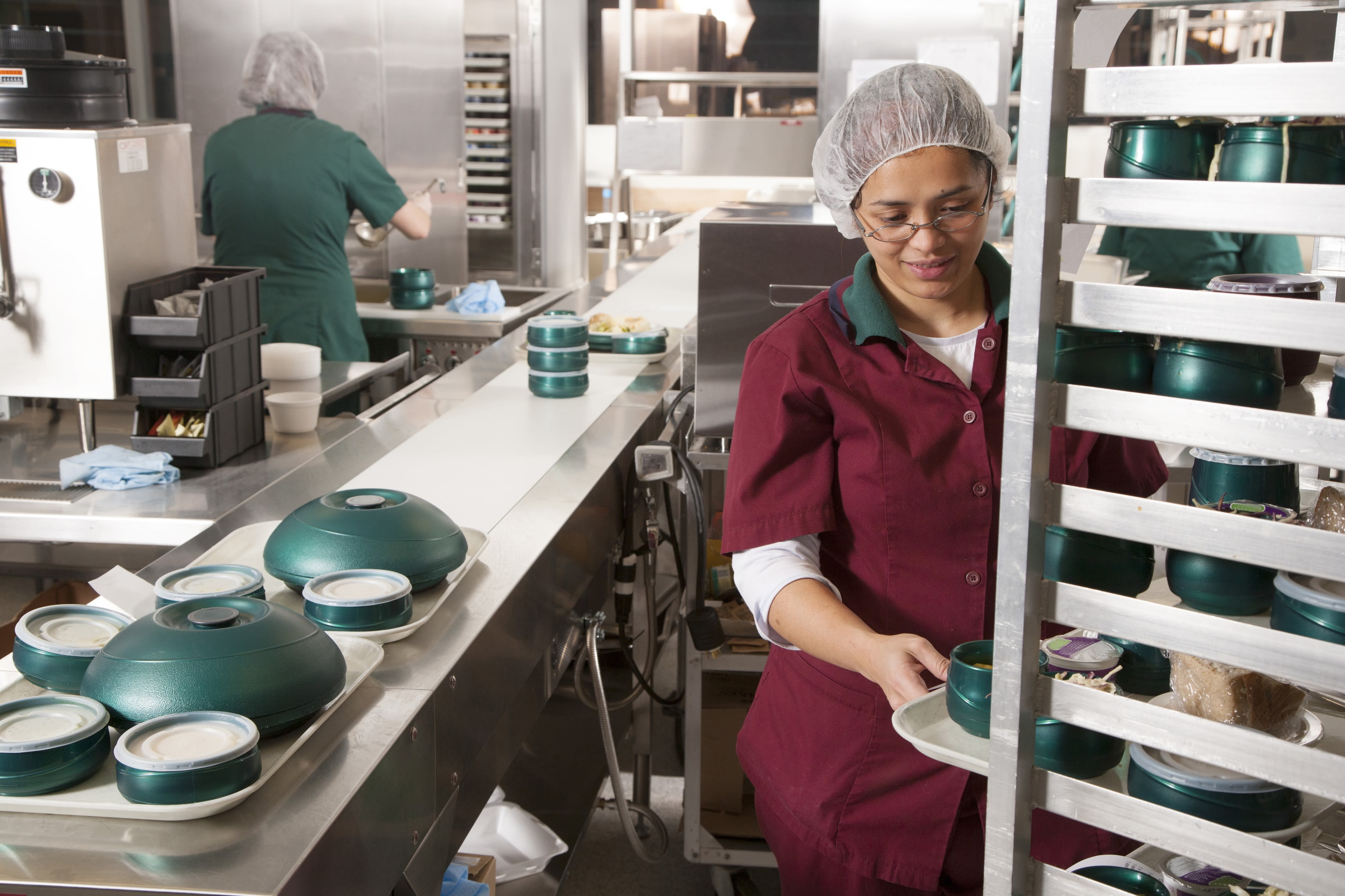
Manufacturing
Labelling transition period ends in February
Manufacturers of packaged food must transition food labels to Plain English Allergen Labelling (PEAL) by 25 February 2024.
Under changes to the Food Standards Code, all allergen information must be declared in a specific format and location on food labels, using prescribed plain English terms, in bold font.
Food packaged and labelled with existing declarations before 25 February may be sold for up to 2 more years under a stock-in-trade period.
For more information, including what must be declared and how, see allergen labelling or the Food Authority’s generate an allergen declaration tool.
Changes proposed to define added sugars
Food Standards Australia New Zealand (FSANZ) drafted a Food Standards Code variation to clarify requirements for voluntary nutrition content claims in food - Proposal P1062 Defining Added Sugars for Claims.
On 1 December the Food Ministers’ Meeting (FMM) agreed to inform the FSANZ Board the FMM will not request a review of the draft standard, which will incorporate a definition of added sugars into the Food Standards Code. This will support work on ensuring ‘no added sugar’ claims align with dietary guidelines. Following FSANZ gazettal there will be a 4-year transition period for the changes to claim conditions for ‘no added sugar(s)’ and ‘unsweetened’ nutrition content claims (and synonyms).
Read more on the FSANZ website.
Prosecutions
Prosecution – L'Oven Bakery Supplies Pty Ltd and Company Director
A Granville bakery wholesale facility - L’Oven Bakery Supplies Pty Ltd, who supplies products to several retail outlets was recently prosecuted and fined $82,500 by the Food Authority after pleading guilty to 23 charges for offences under the Food Act 2003.
The same 23 charges were also put to the Company Director, pursuant to section 122 of the Food Act 2003 on the basis of executive liability. This person was also issued with $82,500 in fines after pleading guilty to all charges.
The offences related to hygiene, cleanliness, food storage, maintenance of premises, pest access and labelling of food products.
Operators of food businesses that are convicted of offences are published on the NSW Food Authority’s name and Shame register and remain on the register for a period of two years.
CEO of the NSW Food Authority Dr Lisa Szabo said “this really is a reminder for businesses to put some thought to upholding the highest food safety standards, if you do the wrong thing you will suffer the consequences.
“NSW consumers deserve to have confidence in knowing the food they purchase is safe to eat and will cause no harm to them or their family.
The Food Authority will continue to check for, and take enforcement action against, food businesses that fail to maintain their premises and equipment to a standard that ensures the safe production of food in NSW.”
Details of the L’Oven Bakery Supplies Pty Ltd and the Company Director prosecutions can be found on the NSW Food Authority’s Name & Shame register of Prosecutions.

Processes | Calendar | Resources
Processes
FSANZ invites written submissions on the following:
- Application A1276 – Food derived from herbicide-tolerant soybean line MON94313: To seek approval for the sale and use of food derived from soybean line MON94313, genetically modified to tolerate the herbicides glufosinate, dicamba, 2,4-D and mesotrione. To read the call for submissions report click here .
Submissions on this application are due by 6pm (Canberra time) 11 December 2023
- Application A1273 – Steviol glycosides as a food additive in Food for special medical purposes: To amend the Australia New Zealand Food Standards Code to permit steviol glycosides to be used as a food additive (intense sweetener) in Food for special medical purposes.
Submissions on this application are due by 6pm (Canberra time) 15 December 2023.
- Application A1254 – Rosemary extract as a food additive – extension of use: To extend the uses of Rosemary Extract (E392) as a food additive (antioxidant) to other food classes.
Submissions on this application are due by 6pm (Canberra time) 15 December 2023.
- Application A1247 – D-allulose as a novel food: To permit D-allulose manufactured by an enzymatic conversion of fructose to D-allulose using Microbacterium foliorum SYG27B-MF containing allulose-3-epimerase.
Submissions on this application are due by 6pm (Canberra time) 20 December 2023.
FSANZ is using a new platform for this consultation. View the A1247– D-allulose as a novel food consultation on the FSANZ Consultation Hub to make your submission.
- Application A1257 – Australian native bee honey: To amend the Australia New Zealand Food Standards Code to include a definition, compositional requirements and requirement for a prescribed name, for honey produced by stingless bees native to Australia.
Submissions on this application are due by 6pm (Canberra time) 17 January 2024.
*For information on how to make a submission, visit the FSANZ website.
*Reproduced from FSANZ website
Calendar items
- Retail Information Session, co-hosted with Port Macquarie-Hastings Council
- The Westport Club, Port Macquarie, 20 February 2024 - Sydney Royal Easter Show: 22 March – 2 April 2024
- Foodservice Australia: 19-21 May 2024
New webpages and resources
- Food safety requirements for children’s services in NSW (PDF, 544 KB)
- Standard 3.2.2A guideline for school canteens (PDF, 336 KB)
- Standard 3.2.2A guideline for supermarkets, greengrocers and delis (PDF, 338 KB)
- Standard 3.2.2A guideline for businesses (PDF, 352 KB)
- Potting mix storage and display fact sheet for retailers (PDF, 74.8 KB)
- Leftovers webpage
Updated webpages and resources
- Periodic review of the risk assessment: Dairy Food Safety Scheme web page and risk assessment
- Prosecutions – L'Oven Bakery Supplies Pty Ltd and Company Director
- Annual Food Testing Report 2022-2023 (PDF, 167 KB)
- NSW Shellfish Program Relay Procedures (PDF, 134 KB)
- 2-hour/4-hour rule for businesses fact sheet
- NSW Standard for Construction and Hygienic Operations of Retail Meat Premises
- Standard 3.2.2A Food Safety Management Tools quiz
Subscribe to news and alerts
Don’t miss a thing! Sign up for our custom email alerts and tips to stay informed on topics that interest you:
